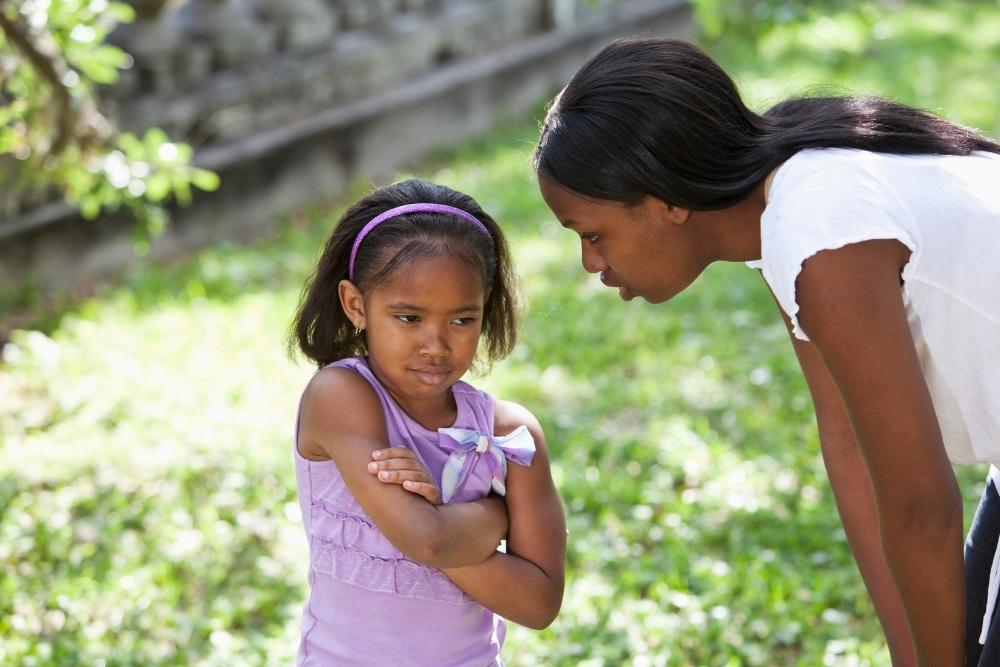Parenting is only hard when you’re doing it right. That’s what my aunt told me when I became a mother to two beautiful twin boys 9 years ago and it turns out she was right.
View in gallery
As parents, it’s not that we necessarily to give out punishments when our child needs a firm form of guidance but it’s that we have to.
And each parent has a different style or better yet, you could call it a rhythm to the way we serve up consequences to our young.
Nonetheless, we can all learn from one another the best forms or consequences, which one’s work or more importantly, those that don’t?
The parenthood community is filled with advice, go-to’s, no-no’s, and experience from those that have done many which are certainly something we’ll need to have when discussing how to help our kids understand we love and care for them.
Tried and true methods to discipline your children recommended by the experts
Remove your child from the activity they’re currently participating in
If your child keeps making a fuss as they’re engaged in some activity like playing with toys or a friend, remove your child from their activity.
Sometimes what your child needs is to be reminded that having privileges like engaging in a certain activity is allowed because of positive behavior exhibited by them.
Make a space in your home that allows your kid to talk over intense feelings
If your child is acting out and you don’t know what to do, try setting up a place for your child to talk about the feelings they have. Teach them that it’s okay to have the feelings they do, and how helpful it is to talk about them.
Turn the negative into the positive and have your child say it out loud
If your child has a habit of saying mean things to others or about everything for that matter – have them replace the bad things they say with 5 positive things.
Have your child say, out loud, or write down (if they are capable) 5 good things for every negative thing they say.
View in gallery
Second chances are always appreciated by young children
If you’re feeling like they can and will do better next time, offer your child a second chance. Kids tend to learn through repetition so even if your kid does the same thing again that got them into trouble, it won’t hurt.
That said, second chances require a lot more patience than other forms of discipline because you have to accept the fact that your child may not pull through – and that’s okay!
Losing their favorite privilege for a day
Removing privileges for the day is a great way to address older kids who have gotten themselves into trouble.
This may work starting around age 3-years-old, before that they really have too short of an attention span to grasp the fact that one privilege was taken from them for something they did.
Starting around age 3.5-years-old children start understanding that they have specific privileges that are ‘fun-time like coloring or going out to play for an extra-long time.
When your child starts looking forward to certain playtimes is roughly the age you can implement taking it away for poor behavior.
Toys go bye-bye when they act out
In addition to taking away certain privileges when your child acts out, toys work the same way. This is the short-cut version of taking something away for what they did wrong.
Taking a toy away gives an immediate feeling of loss for poor behavior for your child.
Tell your kid that it’s time for a nap or bedtime early and that’s taking care of themselves
Early bedtime and nap time is a big one in my family, and I truly feel passionate about this one because if you think about it, even as adults we get grumpy when we’re tired – kids do the same thing.
Kids are constantly going through growth spurts, and that requires a lot of sleep and some extra food.
Pay attention to when your child is acting out and address the solution of more sleep with them when they start throwing fits or acting out. This works at any age – my 9-year-olds benefit from this approach.
Explain to your child how you can see they’re tired, and resting when we feel grumpy is taking care of ourselves. Tell them that until they have an hour of restful time they aren’t able to do anything else.
View in gallery
Keep performing your activities throughout the day until they get the point
Ignoring a steady attention-seeking child is another way of addressing the way they are acting out for your attention.
As parents we realize that some attention for our children is constructive while giving all of our attention to our child when they demand it, is the opposite of constructive.
You can simply go about your business when your child does this, and trust me, you will know. Usually when a child is selfishly demanding your attention, all.. day… long… they keep doing it even when you attempted to help them several times, it gets more intense each bout.
Give them no other option than to do what you’re asking
Making it clear that your child must do what you are asking them is a great way of getting right to the point.
Your child might not like that they have to do what you’re saying, but, ultimately this can be very constructive in teaching them “we don’t always like what we have to do.”
You will find that doing this in the right increments at the right times, teaches your child resilience and endurance toward life.
I will say, this consequence should not be used for everything, save this one for the really important and productive consequences. If you use it too often, resentment can form toward you on your child’s part, instead of them feeling that you’re trying to help.
Natural consequences are a good parent’s best friend
So your child keeps jumping off the top bunk of their bed, and you’ve told them many times not to? A natural consequence will surely happen, hopefully, this time it doesn’t result in a broken arm or leg, yet… there is only so much you can do as a parent who cares.
Allow natural consequences to teach your child when necessary, sometimes they just have to satisfy the urge they have to do potentially dangerous activities as they grow up.
You’d be surprised how quickly they change their behavior once they understand they too can get hurt or lose friendships for being mean to other kids.
Have them do a chore that’s related to their choice
Chores that reinforce what you’re trying to discipline your child through are hopeful beyond measure. If your child is jumping on the couch and disrespecting the family furniture, then have them tidy the couch instead.
Tell them that they must do x,y,z chores every day until they learn to no longer do what’s inappropriate to do.
My kids were constantly playing with their food by spitting it out at the table, and I instead had them clear everyone’s plate from the table each night and wipe it down.
They stopped making a mess with their food that same week because they realized the depth of ‘someone has to clean it up.’
View in gallery
Ask them to go to the couch and treat it as a cry space
This consequence works well for children who are overwhelmed and tend to act out based on feeling that too much is happening internally or externally in their life, give your child a cry space.
A couch or their bed can be a good space for your child to cry it out without being bothered.
Kids have big feelings too, and usually when they’re acting out what they’re really saying is that they don’t yet know how to express the way they feel. Giving them a space to process their feelings is a productive consequence.
Sending your child to their room for rest encourages beneficial alone time for thinking
Alone time or rest time is another very helpful way of guiding your child to have beneficial self-discovery moments.
Really, they are the only ones who can get to know themselves on this level, thus sending your child to their room alone to rest is one of the best ways to redirect your child in challenging times.
Leave the area for a refreshed environment
Sometimes children are more triggered by their environment than they are anything else. If your child is sensitive to certain lighting or the number of people in a given environment, they can become overwhelmed which is unhelpful to them staying out of trouble.
Oftentimes children don’t know how to express that they aren’t taking kindly to the environment they’re in, and they just end up acting poorly instead.
When you have a feeling this is happening to your child, try removing them from the environment in hopes they will do better when they enter a different setting.
It’s mom time until you two sort it out together
Sometimes kids tell you how much they don’t want to be around mom or dad when they get stressed out.
They might even say hurtful phrases to their parents without truly meaning what they say. In times where your child doesn’t want to be around us parents, that is the time they need us the most.
Mom or dad time can help encourage your child to stick it out through the good, the bad, and the ugly. This can help their future relationships as well as their ability to work through uncomfortable situations with the people they love.
Tell your child “it’s mom (or dad) time until we sort through this together – period.
View in gallery
The next treat time they will have to miss out on
Don’t allow your child to have treats if they have poor behavior. This is one sure way of teaching them that their actions have a direct connection to what teats and prizes they get.
Don’t allow your child to have the treats you pass out the next time you would’ve offered them, and let them know clearly that’s what is going to happen – explain they don’t get treats unless their behavior gets better.
Now they earned a job for poor behavior
Give your child an ‘earned job’ for their less than par behavior – because that’s what it get’s you. Assign a job to your child that you know they aren’t exactly fond of, or give a more lengthy earned job to help them understand that you won’t tolerate their behavior.
Earning a job teaches your child to have the discipline to turn their attitude around, make sure that they perform the job well that way they don’t get off the hook being lazy about their earned job.
If your child is lying, these are the best consequences
Lying comes with different consequences than regular poor behavior, more intense consequences if you will.
Lying should be clearly unacceptable and the consequence should stand out to your child in a way that is different than the other forms of discipline you place upon them.
Distinguish the difference between the lie and the offense
Before you place a consequence on a child for a lie, be sure that you let them know that they are not necessarily in trouble for what they did… i.e, who broke the remote or spilled their cup of milk rather they are getting reprimanded for the fact that they lied about it.
Don’t take it so seriously and personally just try to teach them to do better
When you catch your child lying, don’t take it personally that they haven’t told the truth. As children grow up they are bound to test the waters between truth and altering the truth to their benefit.
You just have to remember that they aren’t adults flat out lying, they’re young and learning.
Aim to teach them that lying is an unworthy character trait to have, especially as you grow up. Teach them the better route of being bold and honest rather than untruthful and cowardly.
View in gallery
Give a do-over when you catch your child lying
Second chances are entirely appropriate when a child is caught in a lie. You can’t hold them to the fact that they twisted the truth or didn’t feel comfortable telling you something at all.
Children need to see that even though mom or dad is upset that they didn’t tell the truth, they are still able to eventually work through that together and get the truth to come out.
Allowing your child a comfortable ‘do-over’ space is a good start to teaching your child that they can tell you anything and you’ll still accept and love them.
A moment to come clean changes the lie
If you direct the conversation about the incident to be welcoming and encouraging toward your child coming clean about a lie, they have a better chance of actually doing that.
Instead of asking questions (an opportunity to lie), instead, make statements that conclude you already know what happened – “How did you even get on the counter to take a cookie, that’s really high up there?”
Approaching a situation this way proves to them that lying about something doesn’t pay off, because usually, someone around has already seen what you have done.
If your child is refusing to do what you asked of them, you can provide these structural consequences
One of the biggest battles a parent of children aged 5-years-old and upward will have is that kids eventually stop wanting to do the difficult tasks and will do what they can to get out of having to clean their room or eat their veggies.
Naturally, we have to provide some sort of consequences to prove to be lessons for why we must remain diligent in doing the things we don’t want to, even when we don’t want to.
This is more about building quality habits than anything else, your child will build a better overall quality of life if they understand that when we don’t want to, is the most important time that we do.
Make sure that your child completes the first thing before they move on to the next task
One sure way of helping your child get thing’s done is to ensure they complete one task before they move on to the next task, fun or not.
View in gallery
In South Africa, they live by these standards in everything they do. They simply don’t move on to the next task until the previous one is fulfilled to the best of their ability.
Tell your child that they cannot do this-or-that if they do not complete the task at hand first and foremost. This approach works especially well when your child only wants to do the fun stuff like technology time or playing outside but not their chores.
Implement a timer if your child doesn’t want to stick to completing a task
Using a timer works well for a lot of different activities; brushing teeth, finishing dinner, or cleaning up the bedroom when asked to do so. Kids love timers, so try to implement one when your child isn’t looking forward to the task at hand.
Let them know in an inviting manner that you’re starting the timer for them to finish their task or meal and that they will see that it doesn’t really take that long when they consistently work at it.
Parents often find that using a timer helps children develop a greater sense of time, helping them realize that they don’t need to stress as much about getting the first task out of the way, once they understand it doesn’t take as long as it feels.
Soon they will understand that it’s really a matter of crossing it off their checklist so that they can move on to other more desirable activities that they want to do.
Instead of wasting so much time dreading the not-so-fun activities, we can set a timer to try to ‘beat’ in order to get it done.
Teach your child that time management is their responsibility too
Most of us parents will assume all responsibility for the way our day goes, and it doesn’t have to be that way. When you have children, you have to consider that they have feelings, desires, plans regarding their day too.
If your child is struggling to do what you ask of them, which is resulting in a lot of wasted time – it’s time to teach them firmly about time management.
Tell them that bluntly that when they don’t do what you ask them to the first time, it doesn’t change whether it needs to be done or not, it simply wastes more of everyone’s time.
View in gallery
Ask them to look at the clock or you can tell them what time it is, then ask them to pay attention to how long it feels for 5 minutes to pass – when 5 minutes have gone by asking them to tell you if that felt like a little or a long time to them personally.
Whatever their answer is, play on it. If they say 5 minutes felt really long, then direct the discussion to be encouraging of how much we can get done in 5 minutes if we use our time efficiently.
If they say it went by really fast, then tell them that’s right 5 minutes is not that long at all and that we only spend a small portion of our day doing ‘chores’ so why get worked up over it.
Ultimately make the time we focus on it longer instead of how long it would take if we complete the task without hesitation.
When your child starts ‘wasting time’ again, let them know how many 5 minute chunks have passed with their fits or reluctance to finish their task.
I have found that including my kids in the time management of our day, changes the entire household dynamic and that they love to feel a sense of responsibility and control over their day.
When your child attempts to say bad words, tell them that we don’t talk like that
Most kids at some point in time will try to say a bad word(some younger than others), this is when you need to be frank with them that speaking this way is not appropriate for young children.
If they have heard you speak that way, reassure them that at some point in everyone’s life they grow up and get to choose if they want to say bad words or not.
Though, you should be sure to teach them that speaking that way even as an adult has consequences and even adults can choose a better language.
Remind them of their age, how young they really are, and that it is unacceptable by you, society, and should be unacceptable to their own character to say bad words at such a young age.
I have found that even children as young as 3-years-old can grasp that they are responsible for saying offensive words, and that’s a no-no for them.
To follow it up, ask your child to choose a better word or phrase to describe what they were trying to say. Then praise them for doing diligence to come up with a more appropriate way of expressing themselves.
Schedule a meeting time with your child to go over expected behaviors
View in gallery
Set up a time with your child to have a meeting with them, this will give them a time for you to go over the types of behaviors you expect out of them. Be sure to give your child a chance to discuss how they feel about your expectations too.
You may find that having this dedicated time to talk over expectations with your child reveals some valid concerns that your child may have.- your child’s concerns accumulate as valuable information for you, as a parent, to understand.
You can help relieve their concerns by working through them with them or offering coping skills for your child to use when these concerns come up for them.
When your child has fewer questions and concerns about what is expected from them, they will have better behavior overall.
Use positive consequences to encourage your child to do better as a human being
When a child is encouraged to do better it is usually pretty obvious to parents, when you see this you may see reciprocated positive communication.
It’s a physically ‘perked up’ manifestation of their body language as they fulfill what they need to, and them being proud of the good work they have diligently completed.
Kids have bad days too… sometimes they just aren’t feeling up to it and they will show that by being defiant toward what you have asked them to do – if you suspect your child is having a day like this, it’s important to take it easy on them.
Use time with relatives as a positive consequence for good behavior
If your child is acting up, then remind them that we must act appropriately to be around our relatives: aunt, uncle, cousin, and grandparents are all people who you can encourage your child to look forward to seeing as a reward for good behavior.
Positive attention and praise from you toward your child
When your child is acting with poor behavior, don’t offer as many big smiles, kisses, or hugs.
This might sound like the complete opposite of what you want to do when your child seems like they just need a hug and are down in the dumps resulting in bad behavior yet, it’s important to implement this distance.
View in gallery
If you pull back, instead of leaning in when they are acting poorly, they will feel this and start to understand that poor behavior doesn’t get them any attention good or bad.
Aim to keep it plain jane when you do this, you can respond to basic responses to general questions if you’re pulling back the positive encouragement.
On the other hand, when they’re doing well, you can positively encourage them to do better. Instead of pulling back on the positive encouragement you can push forward in this manner and give your child more positive encouragement.
Have your child write down what they will do differently next time and what they did wrong
If your child is able to write a few words or a full sentence, ask them to write down or say what they did wrong and then tell you out loud what they will do differently next time.
If your child has a hard time remembering what they did wrong, this can help reinforce their memory of it.
You should write it down once for them and then ask them to copy it 5 times. Attempt to write just a few words, for instance: “ I will not kick.”
Children who don’t do well with voice commands do great with this form of discipline because it helps them comprehend their poor behavior in a different way.
Change the way you speak to your child so that they view it as a reward
It’s all about how you speak to your children that gets them to go deeper down the rabbit hole of poor behavior and defiance or change their thinking and get excited to get it over with.
Be sure that you use words and phrases that encourage there is a reward at the end of their accomplishment.
Say things like “ When you get done sweeping the kitchen you can go outside” instead of saying “You don’t get to go outside because you won’t sweep the kitchen today.”
These phrases mean the same thing, except the first one is encouraging movement and productivity while the second is reinforcing your child being stuck in the challenge.
Plan a treat date with your child if they have good behavior all week
View in gallery
Make a deal with your kid that they will get to go on an ice cream or candy store date with you if they have good behavior all week.
This is a sure way to get your kid to behave well, as long as you are reminding them of what’s at stake when they act out throughout the week this can be a great way to overcome poor behavior.
Some kids thrive on a token or chips system
Let your kid know that they can now earn points, tokens, or chips for positive behavior and completing their chores. In turn, when they exhibit poor behavior they will lose their tokens… at the end of the week they can cash their tokens in for treats or prizes.
[amalinkspro type=”showcase” asin=”B07WNDP3FV” apilink=”https://www.amazon.com/dp/B07WNDP3FV?tag=mominformedcom-20&linkCode=osi&th=1&psc=1″ new-window=”true” addtocart=”false” nofollow=”true” sc-id=”5″ img-sizes=”500:400″ imgs=”https://m.media-amazon.com/images/I/51ASaDRLsML._SL500_.jpg” link-imgs=”false” btn-color=”#ff9900″ btn-text=”Check Price” alignment=”aligncenter” hide-prime=”0″ hide-image=”0″ hide-price=”0″ hide-button=”0″ width=”550″]Glass Mason Jar Piggy Bank with Regular Mouth Slotted Lid and 16 Oz Mason Jar[/amalinkspro]
Some kids are motivated by the points system, they love the idea of working toward something and gaining the reward over a shorter period of time – it keeps good behavior active in their minds.
Give your child a time out at the table if they can’t manage good behavior
Timeouts don’t have to be in the corner, they can be at the dining room table, on the couch, or on mom’s bed – all of these places give a place for your child to regroup. Give them a timeout based on how old they are, this is usually what kids can handle.
As you place them in timeout let them know that this is a time for them to think about their behavior and how they will change it after they are out of time out.
Employ a few of these consequences that way your child doesn’t get used to one
Children are always changing and learning and building resilience towards various consequences – be sure that you change the way you employ these consequences. Your child might not benefit from the corner after using a few months in a row.
That said, not all bad behaviors deserve the same consequence, it’s really important for you to evaluate which consequences are appropriate for your child at that time.
For instance, timeout at the end of the day when it’s getting dark outside and close to bedtime can be scarier to kids than during the morning time.
You can employ a break in their bedroom and take away book time during a particularly challenging night and utilize two consequences instead of just one.
Remind them that they are the child and you are the parent, not just their friend
From time to time, kids will lose sight of their position in the family, and in turn, they also will lose sight of your ‘parent’ position as well.
This in itself can cause children to act out, they think that they get free reign of what they’re allowed to do and what they aren’t supposed to do.
Unfortunately, as much as freedom and responsibility for your child is welcomed and encouraged, sometimes that can go too far and winds up getting them into trouble.
Remind your child of their age, what’s appropriate for them, and that you are the parent – which means they don’t get to break the rules without consequences.
Disciplining your child doesn’t have to be harsh but consistency is the key
View in gallery
Consistency is more important than being harsh, loud, or frightening your child into doing what you want them to. They need to be reminded that you love them even after they get into trouble, the best to do this is by simply telling them how much you still love them.
When you are consistent yet gentle with your discipline, children respond better and are able to think more clearly. Stress and tension make disciplining your child much harder, as contradicting as it sounds.
However, think back to the last time someone got really upset with you. It’s likely that you’ll remember feeling your heart pump faster and your mind starts to race – which is exactly how your child feels too.
Having a calm mind in the face of hardship is the best way to work through problems, which is the ultimate goal in teaching our children appropriate behavior.
After all, that’s what we are aiming to do – teach our children and not control them.
Remember that you’re in this for the long run, not the short term wins – you want to create a healthy bond with your child and teach them the way’s your family values in terms of behavior and what is appropriate for their age.
If you need to take a moment and take a deep breath before disciplining your child, take it
Talking to your child when you feel frustrated can be difficult, no matter who you are or what parenting style you perform – there are moments of frustration.
If you can step back and take a deep breath in the times that you feel frustrated you can save yourself a lot of regrets.
No one feels good when someone says something rude to them, or they’re the ones who end up saying something rude to someone else – we’ve all been on both sides.
It’s important as a parent to find your limit, when do you need to step back and take a moment before responding to your child’s troubles.
The last thing we want to do as parents is hurt our little one’s feelings, and yet, this happens so easily and often.
View in gallery
Take a moment to breathe as deeply as you can into your lungs, and then ask your child to sit with you to calm the entire situation before you speak with them about their consequence.
If you say something rude in the mix of trying to discipline your child don’t be afraid to come back around to it and apologize.
In conclusion
When starting to incorporate consequences in your child’s life and your parenting timeline, be sure that you save the consequences for children 3-years-old and upward.
Kids younger than 3-years-old don’t exactly comprehend why they’re in trouble or even that it’s to stop the behavior they’re exhibiting.
Young babies will be very confused and just feel the intensity of your energy rather than what is going on if you try to get them in trouble – which is just heartbreaking.
Once your child seems mature enough, which is not the same age as every child, you can begin teaching them to correct their behavior through discipline.
The biggest set of rules in order to effectively choose the right consequences for your child are.
Pay attention to your child’s temperament, learning style, and what they value in their lives then use these aspects to encourage effective discipline in your household.
Sources
School-Aged Kids Discipline: Strategies and Challenges
7 Ways to Give Your Kids Consequences That Really Work
Negative consequences: how to use them in behavior management






